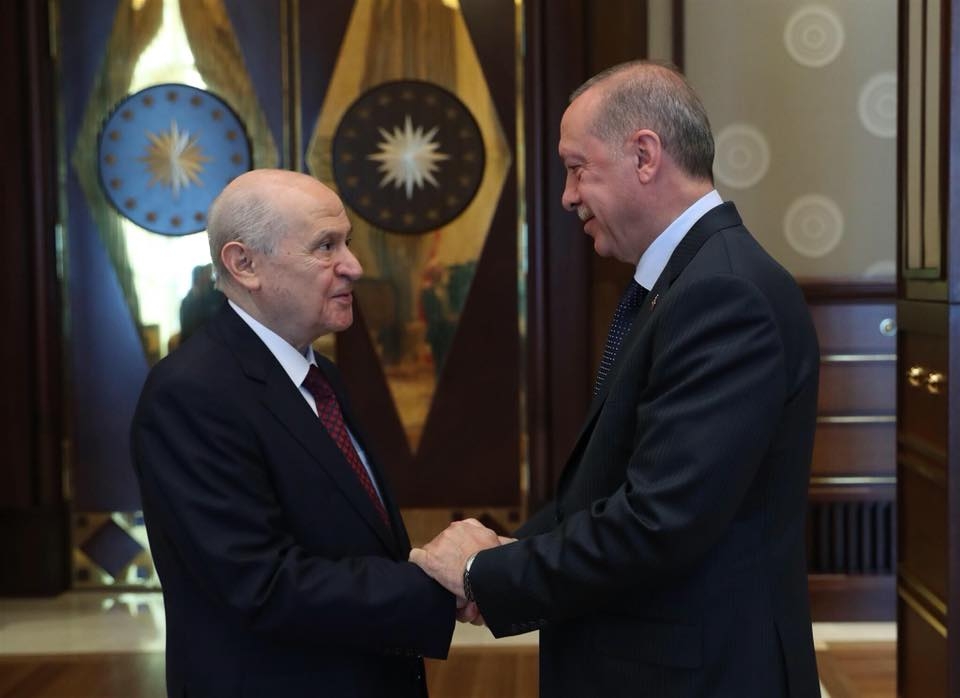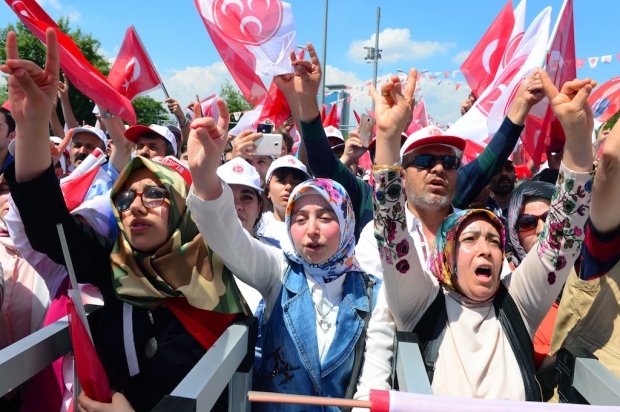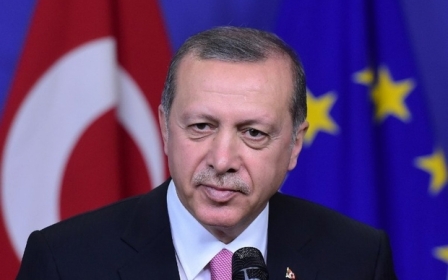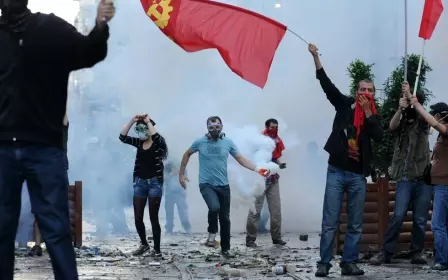Turkey's ruling party renews alliance with far-right MHP for local elections

ISTANBUL - The parliamentary alliance of the ruling Justice and Development Party (AKP) and the far-right Nationalist Movement Party (MHP) looks set to continue in Turkey's local elections on 31 March, despite suggestions that the two had split.
Following a meeting with President Recep Tayyip Erdogan last week, MHP leader Devlet Bahceli on Saturday announced that the People's Alliance, originally formed for the 24 June parliamentary elections, would continue and that the nationalists would support AKP mayoral candidates in the cities of Ankara, Istanbul and Izmir.
Speaking during a party meeting in the southern province of Antalya, Bahceli warned that the opposition parties - specifically the secular-nationalist Republican People's Party (CHP), pro-Kurdish Peoples' Democratic Party (HDP) and the centre-right Iyi Party - would be setting out to undermine the new presidential system in Turkey, and that the 31 March elections would be used to question the validity of the system.
"The CHP, HDP, and the Iyi Party are on the same line. These circles who did not yield results on 24 June are pinning their hopes on 31 March," he said.
"They will not be able to undermine the nature of the new governing system."
It's obvious that because of the economic crisis and its failure to tell new things to the public, the AKP is losing votes, most of which go to MHP
- Bekir Agirdir, analyst
The local elections will be held in 81 provinces and hundreds of districts to elect more than 20,000 officials, including mayors and district councils.
The new presidential system, which was narrowly approved in a referendum in 2017 with the support of the AKP and MHP, and which gave increased powers to Erdogan, has been a highly divisive issue in the country.
Istanbul and Ankara, which are two of Turkey's three largest cities and both majority AKP-voting, voted by a small margin to reject the presidential system, as did the CHP stronghold Izmir, the second-largest city.
Ankara is likely to be a particularly contentious battleground. In 2014's mayoral election, which saw an AKP victory for the controversial Melih Gokcek, there was a less than 1 percent margin against the CHP.
Bahceli denied that there had been any backdoor deals to secure MHP support for the AKP candidates in the cities, and said the elections would be a turning point for the country, which was facing "existential crises".
"We will give our full support to the candidates of the Justice and Development Party in the three metropolises, whoever they might be," he said.
"There are no bargains, secret deals or exchanges in this."
One concern shared by the MHP and AKP, as well as their supporters, is the US support for the People's Protection Units (YPG) in Syria, who are affiliated with the outlawed Kurdish Workersʹ Party (PKK) in Turkey.
Another is the US and some European countries' hosting of members of Fetullah Gulen's movement, which the government says is responsible for 2016's failed coup.
According to Bahceli, faced with such threats, the alliance’s continuation was "a must for the survival of the system and the nation".
A 'paradox'
A new package of laws passed in March enabled the creation of electoral coalitions as a means of overcoming election rules in Turkey which require parties to pass a 10 percent vote threshold in order to enter parliament.
In the end, the MHP defied expectations by securing more than 11 percent of the vote, while the AKP lost its parliamentary majority, with many of its votes going to the MHP. Since then, Bahceli has announced the end of the alliance - which gives the pro-Erdogan camp a majority in parliament - only to renew it again.
Then CHP and İyi Parti decided to form an alliance, and we all know that the alliances are more successful. So after this development, for the AKP and MHP, there was no reason to take a risk especially for these upcoming elections, which will be contentious in some places.
- Ibrahim Uslu, analyst
Bekir Agirdir, a senior political analyst at private research and consultancy firm Konda, told Middle East Eye that the AKP was facing a "paradox" and reluctantly accepted the renewal of the alliance.
"It's obvious that because of the economic crisis and its failure to tell new things to the public, the AKP is losing votes, most of which go to MHP," he said
"The electorates vote for MHP, let’s say, to punish the AKP. Since the voters have the MHP option, they are not changing their preference in favour of opposition parties and opposition alliances. So while AKP votes are decreasing, the MHPs are rising, but these votes stay in the same block.”
Opposition alliance
The full details and scope of the alliance are set to be made clear during the meetings in the coming weeks between party officials, although the nature of local elections makes forming a joint strategy difficult.
It is also not clear what the MHP will ask for in exchange for its support for the AKP.
For Bahceli, Mediterranean cities like Adana, Mersin, Isparta and his hometown Osmaniye, as well as the Aegean city of Manisa, are important. His party holds the mayoralty offices in these five cities and have a strong desire to keep them.
However, since the 2014 local elections the MHP has lost votes in these cities, with the AKP putting in a stronger result in the 24 June elections.
When asked about rumours in September that the AKP will refrain from nominating candidates for the local elections in those provinces in return for the support of the MHP in some other cities, Erdogan denied it.
Meanwhile, the CHP and the Iyi Party have been exploring a possible alliance in the local elections. The two parties formed the Nation Alliance before 24 June, along with the Islamist Felicity Party (SP).
Although nothing has been announced officially, Anar research company general manager Ibrahim Uslu suggested the threat of a CHP-Iyi Party alliance was what pushed the AKP and MHP to renew their alliance.
"When they said that they would not enter into local elections as an alliance but nominate their own candidates, they did not finish their alliance. They continued with backdoor diplomacy," he told MEE.
"Then the CHP and Iyi Party decided to form an alliance, and we all know that alliances are more successful. So after this development, for the AKP and MHP, there was no reason to take a risk especially for these upcoming elections, which will be contentious in some places.
"However, in the cities where [AKP] is strong, there is no need to form an alliance."
Stay informed with MEE's newsletters
Sign up to get the latest alerts, insights and analysis, starting with Turkey Unpacked
Middle East Eye delivers independent and unrivalled coverage and analysis of the Middle East, North Africa and beyond. To learn more about republishing this content and the associated fees, please fill out this form. More about MEE can be found here.




